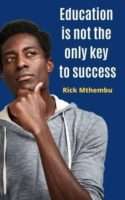It has been drilled into our heads that education is the only way to achieve success and that we cannot thrive in life without education. But I feel that education isn’t the only path to success; it’s merely a stepping stone.
Schools have taught us that failing an exam or receiving a poor grade means you will not have a secure future. They have ingrained in students the assumption that only an educated person has a chance at a high-paying job and a fulfilling career, and that the more educated you are, the more professional alternatives you have. You may have more professional alternatives, but given the unemployment rates amongst even those with a tertiary education, young people have had to seek out other ways of surviving that might not depend on their education level. Many young people are carrying the weight of student debt. Youth account for 59,5% of the total number of unemployed persons. The unemployment rate among the youth is high irrespective of education level. The graduate unemployment rate is 40,3% for those aged 15–24 and 15,5% among those aged 25–34 years, while the rate among adults (aged 35–64 years) is 54%. The statistics speak for themselves. The youth spend years studying a certain course just to become another statistic.
My older brother’s friend spent years studying medicine, working hard and accruing student debt. It was difficult for him to find work when he graduated. After a lengthy period of time, he decided to put his talent to use and become a house DJ. It was difficult at first, but he now earns a lot of money. My house is right next to a large tavern. People come from all over to buy drinks and chill on Fridays and my older brother’s friend also performs there on occasions. The bar owner’s last grade was Grade three, following which he dropped out. They both earn a lot of money and drive great automobiles. They had it in themselves – that will to succeed; they had faith, talent, skills, hard work and perseverance.
Consider Cassper Nyovest, one of South Africa’s most successful musicians. He failed Standard 8, dropped out, and began to pursue his musical career. He now owns a record label (The family Tree), a shoe line (The star recently debuted the RF990), and leads a lavish lifestyle.
I’m not advocating dropping out of school; rather, don’t get overly reliant on education, as it has been demonstrated time and time again that you can get by without it. Have faith in yourself; that you, too, can become one of the best. That you, too, can be as successful as Cassper Nyovest, Somizi, or Kelly Khumalo, despite your lack of formal schooling. Of course, you ask yourself how these celebrities get by, I mean they have no formal education right? The simple answer is ‘experience is the best educator.’ These people derive their form of education from life, they allow themselves to take in the lessons of life from their mistakes and other people’s mistakes, THIS IS HOW YOU GET WISE AND MANOEUVRE.
Life is a never-ending educational process. We rise and fall throughout our lives, learning crucial lessons along the way. Some of these lessons are learned by experience, while others are learned through watching others or reading books, for example.
There is a considerable gap between practical and theoretical experience, regardless of how much we learn from books. Furthermore, there are numerous life lessons that we cannot learn unless we are confronted with particular events. Most individuals would agree that certain lessons arrive at an inopportune times, catching us off guard and unprepared.
The issue is that people become so focused on using schooling to succeed that they forget to explore their natural talents, abilities, and skills. They have no concept of what they can accomplish after high school or varsity since they have no idea what their talents are. Again, I don’t recommend that you drop out, but suggest that you begin exploring your skills while still in school. Keep an open mind to the opportunities surrounding you, learn from different people through socializing, communicate and improve yourself.
For example, I’m in my final year at the University of KwaZulu Natal doing a Bachelor of Education, but I’m working on improving my writing skills. This implies that when I graduate, I’ll have more than just a degree; my ability to compose amazing stories and poems will be put to good use as well. Also, socializing with people has landed me the opportunity to learn about the website called Fundza.mobi where I can share my written work, and get paid for it!
I may not be successful with my degree, or as a teacher, but I can be successful with my writing. The bottom line is that you can be your own boss without a university or college degree. Granted you can acquire the fundamentals to help you in your endeavours to become an entrepreneur. But you won’t learn what it takes to be successful as your own boss at university or school.
Taking everything into consideration, education is necessary, but it is not the only key to success for everyone. This does not imply that you will be no
thing because you are unable to use education to your advantage. Your mind is one of your most valuable possessions; take care of it and nourish it with information (learn from life and different people). Investigate your abilities and limitations; don’t expect to succeed just on the basis of your schooling. Robert Greene, one of my favourite authors, consistently urges a fearless approach to life. A fearless approach implies that you seize the reins of your life and are totally responsible for both your accomplishments and failures. A fearless approach also implies that you push yourself beyond any limit or boundary, implying that everything you have is useful and that if you push yourself hard enough, you will achieve your full potential.


